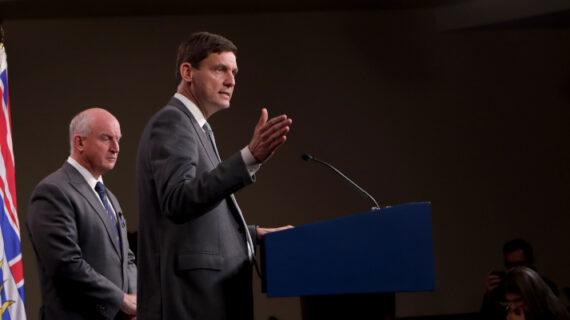- Senator Leo Housakos says the Conservatives are the only alternative for Québecers who do not want high taxes and inflation.
- Former Harper advisor Rodolphe Husny says the Conservatives must not overestimate their potential gains, and that overcoming the Bloc Québécois' as the main alternative to the Liberals will be a challenge.
- Philippe Bolduc, who also worked in the Harper government in senior roles, says signature Conservative policies like lowering taxes and cutting red tape has appeal outside the party's base in Québec City and the Eastern Townships.
Recent polls showing the Conservative Party romping ahead of the governing Liberal Party have filled the Tories with new kind of optimism but, despite good news everywhere else, the party’s numbers have barely budged in Quebec.
What will it take for Conservative leader Pierre Poilievre to break through his party’s hard ceiling in Quebec when the next election occurs?
Leo Housakos, a Conservative Senator from Québec who co-chaired Poilievre’s 2022 leadership campaign, says he has never been more excited about the party’s prospects in the province.
“We have, for the first time since Brian Mulroney, a leader of the Conservative Party who can communicate to the 25 percent or so of the Canadian population which is Francophone,” says Housakos. “That’s a huge advantage to us from a marketing point of view.”
In addition to Poilievre’s fluent bilingualism, Housakos says Poilievre’s wife Anaida connects with Québecers due to being one herself, and by speaking distinctively Québécois french. He says that unlike in the rest of Canada, the Conservatives will have to battle the separatist Bloc Québécois as well as the Liberals for votes.
“The message from Pierre Poilievre will be the same message to both constituencies,” says Housakos, referring to unsure Bloc and Liberal voters. “If you want an alternative to high taxes, high debt, high deficits, high inflation, and hopeless prospects for young Québecers…the only alternative in Québec is the Conservative Party.”
Rodolphe Husny, a former advisor to Prime Minister Stephen Harper, says the choice of who Québecers vote for is usually determined in the final two weeks of a federal election, and after the televised debates that always include at least one in the French language. He says the decisions of Québec voters often come down to a personal feeling about a party leader.
“They don’t vote only with their head, they vote with their heart. For example, Québec voted for Jack Layton because they liked Jack Layton, not because of his ideas or the NDP program,” says Husny, referring to the NDP’s breakthrough in Québec in the 2011 federal election.
Philippe Bolduc, who also held senior roles in the Harper government, says the success of the CAQ, Québec’s nationalist governing party whose base contains large numbers of Bloc and Conservative supporters, proves that Québec separatists will vote for a nationalist alternative when dissatisfied with the other options.
“To attract these voters, the CPC needs to deliver an authentic message not seen as coming from English Canada, but instead from someone who understands Québec,” says Bolduc, which he suspects Anaida Poilievre will play a major role in. “The issues need to be something that resonates. Pierre’s economic messaging on affordability and housing should be effective as Québeckers are struggling like the rest of the country with the rising cost of living.”
During his speech at the Conservative convention earlier this month, Poilievre urged English Canada to take pride in their language and history in the same way that Québecers do theirs.
Husny says that while that part of Poilievre’s speech was directed at English Canada, it is an approach to cultural issues that will resonate with voters in Québec, but Husny says economic issues should still play a central role in attracting votes in Québec.
“When it comes to the economy, it’s true for Québec, and it’s true for Canada,” says Husny. “Canadians and Québecers trust Conservative governments when there’s an economic crisis, and when inflation and the economy is their top priority, which is actually what’s happening.”
Bolduc says the Conservatives will have two campaigns in Québec with different objectives: one in Montreal, and the other outside of Montreal, the latter of which Bolduc says will be a battleground against the Bloc. Unlike Greater Toronto, the seat-rich Montreal region has not been competitive for the Conservatives since the 1980s, with both the Bloc and the Liberals taking nearly every seat there since.
“Montrealers…they talk a lot about environmental issues for example, but it’s easy for them because they have transit, there’s a subway in Montreal,” says Husny. “But if you go outside of Montreal, it’s a whole other reality…people are using their car every day, and a lot of them are using trucks for their work.”
Bolduc says typical conservative values of individual freedom, low taxes, and cutting red tape appeal to the existing Conservative base in Québec, which is mostly in the Québec City region and the Eastern Townships. The Conservatives’ more lenient stance on firearms has been partially blamed for the party’s struggles to gain ground in Québec, but Bolduc says that has only hurt them where they’re already weak.
“Québec has a proud tradition of hunting and farming, and protecting the ability to legally own firearms is as popular as anywhere in the rest of rural Canada,” says Bolduc.

In 2018, Harper’s successor Andrew Scheer polled well in Québec, with the party nearing 30 percent at one point.
Scheer reached out to voters in the province during his leadership by promising to be a strong advocate for Québec nationalism, and he even attracted praise from a former Bloc leader. His Québec lieutenant Alain Rayes speculated that the province could be swept by a “blue wave.”
However, the party’s support eroded during the 2019 federal election, and the Conservatives were overtaken by the Bloc.
Husny says that even if Québec voters are tired of Trudeau and the Liberals, the Bloc will always be a major roadblock to the CPC’s efforts to win over those province voters. He says Rayes’ ultimately incorrect prediction is proof that the Conservatives must temper its expectations in Québec, where he says the party may only gain a few more seats.
Speaking in a recent article with the Hub, poll analyst Philippe Fournier said that even modest Conservative gains in Québec make their path to a majority government far easier in the rest of Canada.
“We don’t know when the election is going to be, two years is a long time in politics,” says Husny. “Like I said earlier, usually people in Québec decide during an election based on debates and a feeling that they have towards the leader.”




